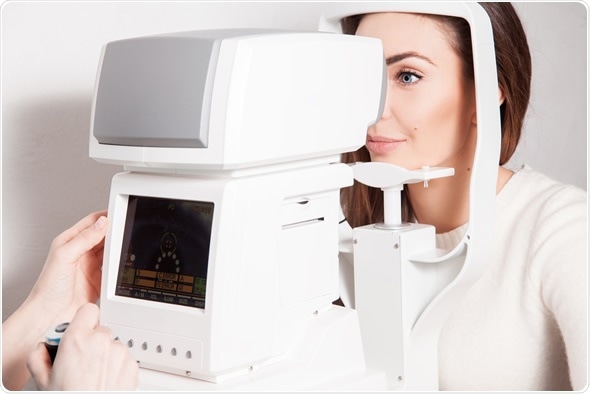Ophthalmology is the specialized field of medicine that focuses on the health of the eye. It includes the anatomy, physiology and diseases that may affect the eye. Historically, the science of ophthalmology encompassed all aspects of visual function, both in health and in illness. Additionally, ophthalmology also includes animal eyes as ocular function and optic diseases are similar among humans and animals.

Patient in ophthalmology clinic - Image Copyright: Stas Ponomarencko / Shutterstock
An ophthalmologist is a specialist physician who is involved with the prevention, diagnosis and medical treatment of the eyes. This may include surgical procedures and pharmaceutical interventions and, as such, ophthalmologists have training in both fields.
Aspects of visual function that may be considered by an ophthalmologist while doing a medical examination to make a diagnosis may include refraction, orthoptics, binocular vision and strabismus.
A Career in Ophthalmology
Conditions of the Eyes
Health conditions that affect the eyes are a core part of practice for most ophthalmologists. Some of the common conditions include:
- Age-related macular degeneration usually affects individuals over the age of 50 and may lead to loss of vision due to damage to the macula.
- Cataracts are the number one cause of vision impairment throughout the world, and cataract surgery is the second most common procedure performed in the United Kingdom.
- Diabetic retinopathy involves damage to the blood vessels in the eyes due to excessive glucose levels in the blood. This can lead to vision impairment.
- Glaucoma is a condition that involves damage to the optic nerve in the eye, which can gradually worsen vision.
Eye Health Services
With the current high proportion of an aging population in most Western countries, the incidence of age-related diseases of the eyes such as age-related macular degeneration is on the rise. It is important that diseases of the eyes are detected as early as possible, because timely diagnosis and management help to improve treatment outcomes for patients.
Various treatment methods may be utilized by an ophthalmologist to manage eye health and maintain vision ability. These may include:
- Prescription of glasses or contact lenses to improve vision
- Medical treatment with pharmaceutical agents
- Surgical procedures such as complex microsurgery
The treatment decisions will depend on the specific case and the aim of therapy, and are usually made on a case-by-case basis.
Ophthalmologist Training and Education
The education and training requirements for an ophthalmologist vary significantly according to the region of practice. However, the general guidelines include registration as a medical practitioner following completion of medical school and several years residency, followed by additional study and training in the specialized field of ophthalmology.
Most individuals working as an ophthalmologist are also involved in scientific research about the health and function of the eye, and related diseases or problems that may present.
Ophthalmologists are distinct from optometrists or orthoptists, because they have completed medical training and undertaken a specialization in ophthalmology. This gives them a broader view of health as a whole, and allows them a deeper understanding of eye health and related conditions.
References
Further Reading
Last Updated: Jan 2, 2023